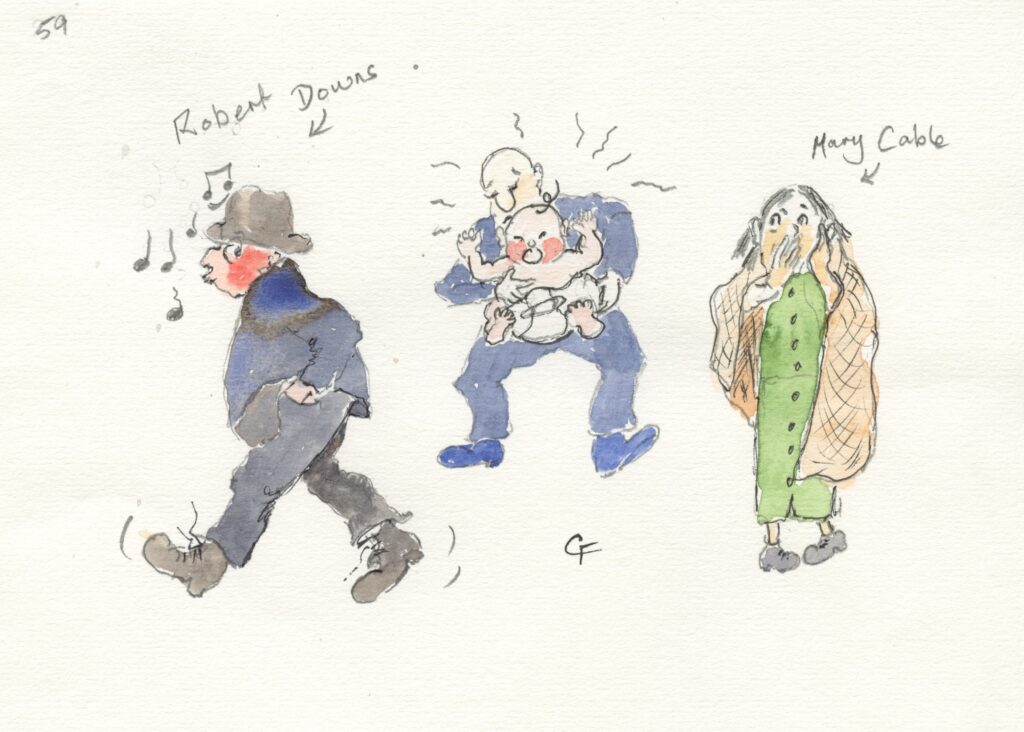
Illustration by Christine Fuller
Maintenance payments for children born out of wedlock is not a modern day provision.
Reputed Father: Robert Downs of Great Ellingham
When Mary Cable of Bunwell was delivered of a male child in the Parish of Bunwell on the 9th May, 1806, and was unable to (or chose not to) provide for her child, the Parish of Bunwell (by the Churchwardens and Overseers of the Poor) became responsible for the child. However, Churchwardens and Overseers would look to the father (and mother) of the child for reimbursement of any cost of sustaining and maintaining the child.
On June 6th, 1806 Mary Cable appeared before two Justices of the Peace at a court held in Bunwell. On oath, Mary confirmed that she had given birth on the 9th May to a male child in Bunwell, and that the child was still alive.
She also told the Justices that Robert Downs, a husbandman by trade, of Great Ellingham was the father of her son.
Robert Downs also appeared before the Justices. As he “hath not shewed any sufficient cause why he should not be the reputed Father of the said Bastard Child“, the Justices made an order that Robert Downs was indeed the father of Mary’s son.
He was ordered to pay to the Churchwardens and Overseers of the Parish of Bunwell a weekly sum of one shilling and sixpence for as long as the child “shall be chargeable to the said Parish of Bunwell“. Mary Cable was also ordered to pay the sum of sixpence to the Churchwardens and Overseers every week “in case she shall not nurse and take care of the said Child herself“.
Reputed Father: William Leeder of Great Ellingham
Farmer William Leeder of Great Ellingham also appeared before two Justices of the Peace at a court held in Bunwell on the 14th April 1818.
On oath, singlewoman Sarah Barnard confirmed to the court that she had been delivered of a female child in Bunwell, and that William Leeder was the father of the child.
After examining the circumstances, the oath of Sarah Barnard, and the fact that William Leeder “hath not shewed any sufficient cause why he should not be the reputed Father of the said Bastard Child“, the Justices made an order that William Leeder was the father of Sarah Barnard’s daughter.
He was also ordered to pay (to the Churchwardens and Overseers of Bunwell) the sum of one shilling and ninepence every week “for and towards the keeping, sustentation, and maintenance of the said Bastard Child” during the time that the child is chargeable to the parish.
Sarah Barnard was also ordered to pay the weekly sum of sixpence to the Parish for as long as the child is chargeable to the Parish “in case she shall not nurse and take care of the said Child herself.”
On the 9th November, 1830, the Justices of the Peace for the County of Norfolk issued a Warrant to the Constables of Norfolk including the Constable of Bunwell, to bring William Leeder of Great Ellingham before them to answer a complaint that he had “neglected and refused to observe and perform” the provisions of the order of the court on the 14th April 1818.
The Warrant declared that William Leeder had not paid the weekly sum of one shilling and nine pence during the last one hundred and four weeks, during which time the child had been chargeable to the parish of Bunwell.
Sources:
1830 Warrant for William Leeder of Great Ellingham for non-payment of maintenance for the daughter of Sarah Barnard. Parish Records of Bunwell. Overseers of the Poor. Bastardy papers. Warrants to apprehend reputed fathers of illegitimate children. Norfolk Record Office. Catalogue Ref: PD712/77/8.
1818 Bastardy order to William Leeder of Great Ellingham, farmer, regarding the daughter of Sarah Barnard. Parish of Bunwell. Overseers of the Poor. Bastardy papers. Bastardy orders. Norfolk Record Office. Catalogue Ref: PD712/76/37
1806 Bastardy order to Robert Downs of Great Ellingham, farmer, regarding the son of Mary Cable. Parish of Bunwell. Overseers of the Poor. Norfolk Record Office. Catalogue Ref: PD712/76/19